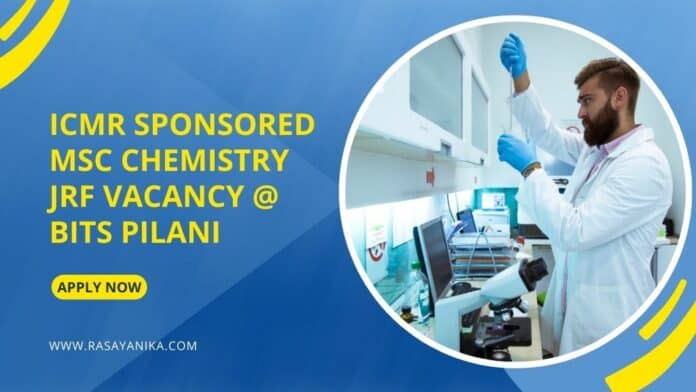ICMR Sponsored MSc Chemistry JRF Vacancy @ BITS Pilani
Dont forget to check out possible interview questions for this job below
Applications are invited from suitable candidates for Junior Research Fellow (JRF) to work on the following project sponsored by the Indian Council of Medical Research (ID No: 2021-8350) in a multidisciplinary project (at the interface of chemistry and biology) at Department of Chemistry BITS-Pilani, Hyderabad campus.
Project Title: Design and development of portable acidosis kit for the rapid, trace level detection of Ketone bodies in biological samples
Duration of the project: Three years
Project position: Junior Research Fellow (JRF)
Number of vacancies: 01
Fellowship amount: INR 31000/- + HRA per month for NET/GATE qualified
candidates.
INR 25000/- + HRA per month for non-NET/GATE qualified
candidates.
Eligibility requirements: First class in M.Sc. (Chemistry) or equivalent degree and passing of NET/GATE test (desirable). Age not exceeding 28 years as of the date of interview
How To Apply:
Interested candidates with the above-mentioned qualification can send their updated CV
along with a cover letter containing research experience, and published research papers (if any), by 10th April 2023, to the PI, Dr. Nilanjan Dey (and coPI Prof. Balaram Ghosh) via email: nilanjan@hyderabad.bits-pilani.ac.in. Please
Dr. Nilanjan Dey
Assistant Professor,
Department of Chemistry,
BITS-Pilani, Hyderabad campus,
Medchal District, Kapra Mandal
Hyderabad-500078
Last Date To Apply: 10th April 2023
View Main Notification
Top Interview Questions and Answers for the above job role:
- What inspired you to apply for this JRF position, and how do you think your research experience and skills align with the requirements of the project?
Answer: I am excited to apply for this JRF position because the project’s multidisciplinary nature presents an excellent opportunity to contribute to the interface between chemistry and biology. My research experience in chemistry and biochemistry, coupled with my strong analytical and critical thinking skills, makes me well-suited for this project.
2. Could you describe your approach to designing a portable acidosis kit for the rapid, trace-level detection of Ketone bodies in biological samples, and what challenges do you anticipate in the project?
Answer: Developing a portable acidosis kit for detecting ketone bodies in biological samples requires a comprehensive understanding of the principles of analytical chemistry, biochemistry, and materials science. My approach would involve studying the mechanisms of ketone body production, designing a sensing mechanism that can detect trace levels of ketone bodies, and developing a portable device that is user-friendly and cost-effective. One of the potential challenges in this project could be the optimization of the sensitivity and specificity of the sensing mechanism.
3. How do you plan to collaborate with other researchers from different backgrounds, such as biology and materials science, in the project?
Answer: Collaboration is crucial to the success of this multidisciplinary project. I plan to collaborate with researchers from different backgrounds by communicating regularly, sharing research findings, and identifying areas where our expertise and skills can complement each other. By working together, we can develop a comprehensive understanding of the project’s scientific challenges and devise solutions that address these challenges.
4. Could you describe your experience working with analytical chemistry techniques, and how would you apply these techniques in the project?
Answer: I have extensive experience working with analytical chemistry techniques, including chromatography, spectroscopy, and electrochemistry. In this project, I would apply these techniques to study the mechanisms of ketone body production and design a sensing mechanism that can detect trace levels of ketone bodies in biological samples. I would also use these techniques to optimize the sensitivity and specificity of the sensing mechanism.
5. How do you plan to contribute to the scientific community beyond this project, and what are your long-term career goals?
Answer: Beyond this project, I plan to contribute to the scientific community by publishing research papers in reputable journals and presenting my findings at conferences and seminars. My long-term career goal is to become a successful research scientist and make significant contributions to the fields of analytical chemistry and biochemistry. I also plan to mentor and train the next generation of researchers, helping them develop the skills and knowledge necessary to tackle complex scientific challenges.
Editors Note: ICMR Sponsored MSc Chemistry Subscribe to Rasayanika for the latest chemistry and Pharma job openings, follow us on Facebook and Telegram and subscribe to our youtube channel for the latest updates on chemistry and Pharma jobs and much more.

















































